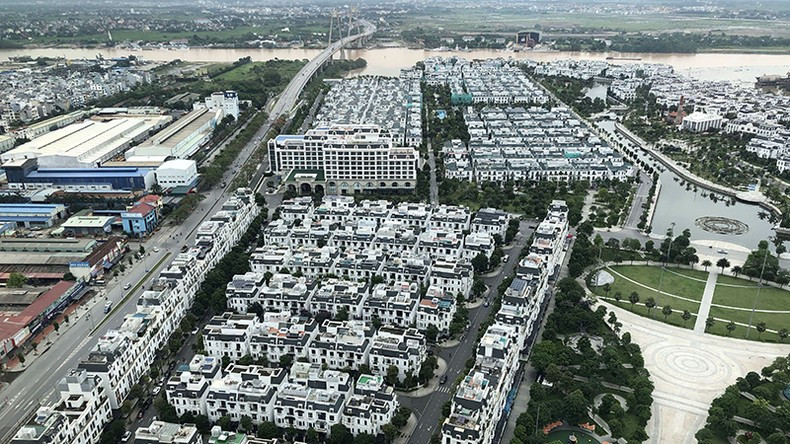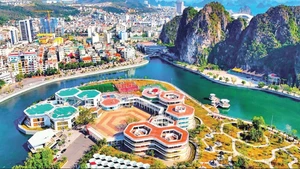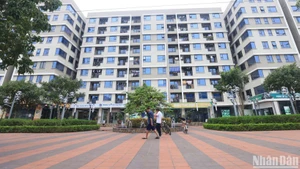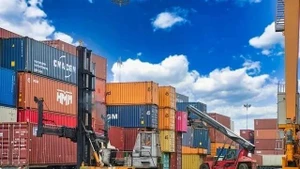Notably, the 2023 Housing Law, 2023 Real Estate Business Law, and 2024 Land Law, which officially took effect from August 1, 2024, have contributed to improving the legal framework and opening a new development cycle for the real estate market. All real estate segments show positive growth signs with many new projects being implemented.
However, the market has also shown signs of “overheating”, manifested through land speculation, housing price inflation, and non-transparent real estate transactions. This requires management agencies to effectively implement relevant policies and laws to maintain stability and develop a safe, healthy and sustainable real estate market in the future.
Resolving obstacles
According to the Vietnam Chamber of Commerce and Industry (VCCI), the real estate market supply has shown positive changes but remains limited, with product structure still not well-balanced. Currently, the country has 2,254 projects implemented with a total of 1.2 million apartments and land plots. Regarding social housing, 622 projects have and are being implemented with approximately 565,177 units. Regarding transaction prices, some localities show increases in certain locations and types.
Overall, the market recorded 30,589 successful transactions in the past 9 months, 2.5 times higher than the same period last year. The market also recorded 38,797 new products offered, with products priced at over 50 million VND per square metre and above having dominated.
VCCI Vice Chairman Hoang Quang Phong assessed that while the real estate market in 2024 still faces many difficulties, it has shown positive recovery towards the end of the year thanks to economic stability and government support policies. The government, prime minister and ministries continue to decisively address difficulties and obstacles facing businesses and real estate projects.
The market has basically stabilised, supply has improved, and segments show positive growth signs with many new projects being implemented. However, currently, localised real estate price fluctuations in some segments and areas still occur, leading to overall market price increases. Therefore, finding solutions for stable and sustainable real estate market development in the coming time is also an objective in the country’s economic development.
Hoang Hai, Director of the Housing and Real Estate Market Management Department under the Ministry of Construction, stated that analysis has identified multiple factors affecting housing real estate price increases, partly due to increased land-related costs and the application of new land valuation methods and price lists. Notably, in some localities, there are cases where land use rights auctions result in winning bids many times higher than the starting prices.
The management and implementation of land use rights auctions in many places remains inadequate. There are instances where investors form groups to participate in auctions, bidding at prices many times higher than the starting price, then potentially forfeiting deposits after winning the auction with the aim of establishing artificial price levels in the area for profit.
Additionally, there are phenomena in which artificial prices and price inflation are created by speculators and real estate brokers who exploit people’s lack of understanding and herd-mentality investing to manipulate and profit, causing damage to customers and reducing transparency in the real estate market.
In addition to localised price increases, Vietnam’s real estate market currently faces many intractable issues, particularly numerous long-term shelved projects that waste national resources and negatively impact both citizens and businesses.
According to statistics, Hanoi alone has nearly 1,500 suspended projects, while Ho Chi Minh City has up to 2,600 projects. This situation is not only causing housing shortages but also reducing job opportunities.
Although management agencies have taken positive steps to resolve difficulties and conducted comprehensive reviews of problematic projects, including delayed projects and shelved projects, according to Dr Le Xuan Nghia, Member of the National Financial and Monetary Policy Advisory Council, the most crucial need at present is to formulate a National Assembly resolution to better address legal, management, and administrative procedure-related obstacles.
 |
| An urban area in Hai Phong. (Photo: Tue Nghi) |
Synchronising solutions
Nghia shared that this resolution will create the necessary legal framework to thoroughly resolve current inadequacies. This is not just the hope of real estate businesses but also the solution to the housing problem for millions of citizens. Without timely action, the market will continue to fall into a vicious cycle, with investment and development opportunities being missed. In particular, with the amended Land Law, the real estate market is expected to open up many new opportunities thanks to more open regulations, creating favourable conditions for investors. Additionally, major infrastructure projects such as high-speed rail or the expansion of road and rail networks will become powerful leverage, contributing to urban formation and opening up future real estate investment opportunities.
Currently, obstacles in land valuation are posing a major problem for real estate businesses, with numerous projects stuck at the land valuation stage. In fact, many completed projects have not been valued for land prices yet, so they cannot be released to the market.
More seriously, if land valuations increase significantly, it creates a vicious cycle between house prices and land prices for businesses and the market. Without timely intervention from functional agencies and the legal system, real estate prices may continue to escalate without stopping. Thus, although real estate prices may appear to show good growth, in reality, there will be no buyers.
Vice Chairman of the Vietnam Real Estate Association Nguyen Van Dinh believes that the real estate market is in a transition phase, making it very sensitive to both positive and negative influences from various actors. The slight growth in some segments could lead to strong recovery if support factors from policy, infrastructure, and finance are met. However, if the issue of rising real estate prices is not addressed early, it will lead to many consequences for both the market and society.
To resolve this situation, the government needs to quickly implement support measures to pave the way for affordable commercial housing projects, social housing, and additional recovery policies for the resort real estate market. In parallel, participation and cooperation are needed from all stakeholders including: state management agencies, professional social organisations, real estate businesses, and real estate brokers.
For sustainable real estate market development in the future, the most important factor is strong reform of related administrative procedures, thereby helping businesses quickly implement projects and increase housing supply, especially social housing and affordable housing.
Additionally, ministries and departments should continue to study and supplement new regulations to meet practical requirements, while promptly detecting and strictly handling violations of regulations, especially in preventing the exploitation of land use rights auctions for profit and market disruption.
















